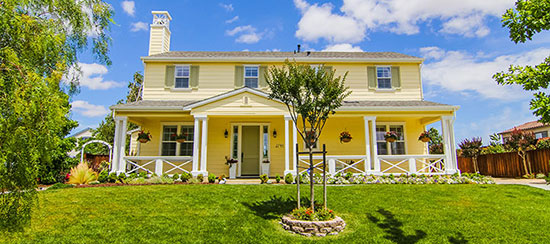
Homes For Sale
Here are some searches for homes in our area.
Fixed-Rate Loans
The fixed-rate mortgage is the most popular mortgage program in use today. Fixed-rate loans offer the borrower a fixed interest rate for the life of the loan, typically 15 to 30 years. Borrowers have peace of mind knowing that their monthly payment will not change over time. Conventional fixed-rate mortgages have underwriting requirements established by Freddie Mac and Fannie Mae, and require certain down-payment and debt-to-equity ratios to qualify. Fixed-rate loans are especially attractive to buyers who plan to stay in their home for more than a few years.
Adjustable Rate Loans
With an Adjustable Rate Mortgage (ARM), the interest rate changes periodically, and payments go up or down accordingly. Rates are tied to an index that reflects the cost of money at any given point in time. Generally speaking, lenders charge a lower initial interest rate for the ARM than for the fixed rate mortgage. If you are expecting interest rates to decrease in the future, or if you are trying to maximize your purchase power today knowing your income will rise in the future, then this loan may be right for you. Adjustable rate loans are attractive for buyers who expect to be in the home for a short period of time.
FHA and VA Loans
The Federal Housing Administration (FHA), offers loans for low-to-moderate-income home buyers. FHA loans have lower down payments, and have relatively easier requirements than conventional fixed-rate mortgages. FHA mortgages have no income restrictions and even those with lower credit scores may be considered. Past bankruptcy does not necessarily disqualify borrowers from using this program!
In addition, the Department of Veterans Affairs (VA) offers a zero-down mortgage program. To take advantage of this program, borrowers need to be among those listed as veterans and service personnel in the U.S. military. One of the biggest benefits of this program is that it eliminates the need for private mortgage insurance!
Local Homebuying Program
There are often many state and local programs available. These programs offer down-payment assistance and programs for local home ownership. Learn more about these local programs, recommended lenders, and other finance options by contacting us today!
Here is an overview of the types of closing costs you may incur on your loan. Some are one-time fees, while others reoccur over the life of the loan. When you apply for your loan, you will receive a Good Faith Estimate of Settlement Charges, and a booklet that will explain these costs in detail.
Loan Origination Fee: This fee covers the lender's administrative costs in processing the loan. It is a one-time fee, often expressed as a percentage of the loan. The origination fee is typically 1% of the loan, but remember, you can obtain a loan with no origination fee and a slightly higher interest rate.
Loan Discount: Often called "points", a loan discount is a one-time charge used to adjust the yield on the loan to what market conditions demand. One point is equal to 1% of the loan amount. This fee is rare when interest rates are low.
Appraisal Fee: This is a one-time fee that pays for an appraisal, which is a statement of property value viewed by the lender. The appraisal is made by an independent fee appraiser and can cost a standard $300 to $450, or much more, depending on the home's size and location.
Credit Report Fee: This one-time fee covers the cost of the credit report that is run by an independent credit reporting agency and is usually about $60-$75.
Title Insurance Fee: There are two title policies: a lender's title policy (which protects the lender against loss due to defects on title) and a buyer's title policy (which protects you). These are both one-time charges, but the one you usually pay as a buyer is $200.
Miscellaneous Title Charges: The title company may charge fees for a title search, title examination, document preparation, notary fees, recording fees, and a settlement or closing fee. These are all one-time charges and can add up to about $200.
Document Prep Fee: There may be a separate, one-time fee that covers preparation of the final legal papers, including the note and deed of trust. These legal documents run about $150.
Lender Fees: Other lender fees include an underwriting fee, a flood certification fee, an amortization schedule fee, and other miscellaneous fees that should be disclosed by your mortgage lender at loan application. These fees vary dramatically from about $450 to $900.
Prepaid Interest: Depending on the time of month your loan closes, this charge may vary from a full month's interest to just a few days' interest. If your loan closes at the beginning of the month, you will probably have to pay the maximum amount. If your loan closes at the end of the month, you will only have to pay a few days' interest.
PMI (Private Mortgage Insurance) Premium: Depending on the amount of your down payment, you may have to pay an up-front fee for mortgage insurance (which protects the lender against loss due to foreclosure). You may also be required to put a certain amount into a special reserve account (an impound account) held by the lender for PMI.
Beginning of the Escrow Account: Your lender will typically have an account w here your property taxes and property insurance will be held. This account will be started with taxes approximately equal to two months in excess of the number of months that have elapsed this year. (If 6 months have passed, they will collect 8 months of taxes.) Your property insurance will be collected one year in advance, plus two months will be kept in your escrow account.
Earnest Money Deposit: It is important to have an understanding of the earnest money deposit, so you will not be placed in an uncomfortable position when you purchase a property. At the time a written offer is initiated, you will be required by the seller to include a personal check, cashier's check, or cash. The amount is normally deposited (cashed) into the designated title company's escrow account upon the offer's acceptance, and will remain in escrow until the time of closing. This amount is credited to you as a partial down payment and represents your intent to purchase the property. If the offer is not accepted, this amount is returned to you promptly. Depending on the price of the property, you should anticipate a minimum of a $1,000 earnest money deposit. Also, in the event that you do not qualify with a lender for a new loan, the earnest money is refunded to you, provided the sellers are given written notice regarding the lender's disapproval, and provided you have supplied the lender with all documentation they have requested.
Title Insurance: When you purchase your home, both you and the lender need a preliminary title commitment that will indicate exactly what recorded liens, encumbrances and recorded easements are currently in effect on the property. The title commitment will also indicate the vested owner of record and any restrictions on the use of the property. Title insurance is, for all practical purposes, required on all property in most states and is normally a seller's expense. However, the buyer is required to furnish the lender with a lender's policy showing the lender as lien holder on that property. These charges will be incurred at the time of settlement as a part of your closing costs. When the purchase of the property is closed, and the title company has recorded the necessary documents, the title company will then issue a title insurance policy binder to you and the lender, showing clear title to the property.
Reminder: For the closing, you must bring a driver's license and a cashier's check for the remainder of your down payment, made out to the title company. At the closing, you may sign the cashier's check over to the title company. If the closing does not occur, you can deposit the cashier's check back into your own account.
There's certainly a lot to know! Have additional questions? Click here and let us know how we can help!
Determining how much home you can afford, or what payment you feel comfortable with, can be a trying process. Calling lenders, looking at mortgage loan programs and interest rates can be confusing, to say the least. There is an easy way to get started, and give yourself an idea of where you stand.
The first step is to find out what mortgage interest rates are at the current time. You can typically do this with a couple of phone calls to lenders or some quick searching on the internet. Get your rates on conventional fixed rate loans.
To obtain a very clear picture of how much home you can actually qualify for, the best idea is to contact a reputable local lender and let them analyze your entire situation. The lender can calculate your income-to-debt ratio, do a quick credit score and give you the information you need. Typically, lenders like to see a ratio not exceeding about 28%. This does not take into consideration long term monthly debt. As an example, to qualify for a loan, lenders may require ratios of 28% or 36%. This means you can spend up to 28% of your gross monthly income on a mortgage payment, and no more than 36% of your gross monthly income on all forms of debt, mortgage included.
We work with a number of loan officers and would be happy to recommend one right for you. Click here to contact us today. We are happy to help!
What is a home warranty?
A Home Warranty is a one-year service agreement that covers the repair or replacement of many major home system components and appliances that typically break down over time due to normal wear and tear. Whether you are buying or selling a house, moving can be hectic. A home warranty specifically designed for residential real estate transactions can give you one less thing to worry about- and help keep your home protected from the expense of unexpected covered repairs during the moving process.
Are you relocating to this area? Looking for more information to help you find the right city and neighborhood for your family?
Our relocation guide includes the most up-to-date and vital information for people looking to move to our area.

